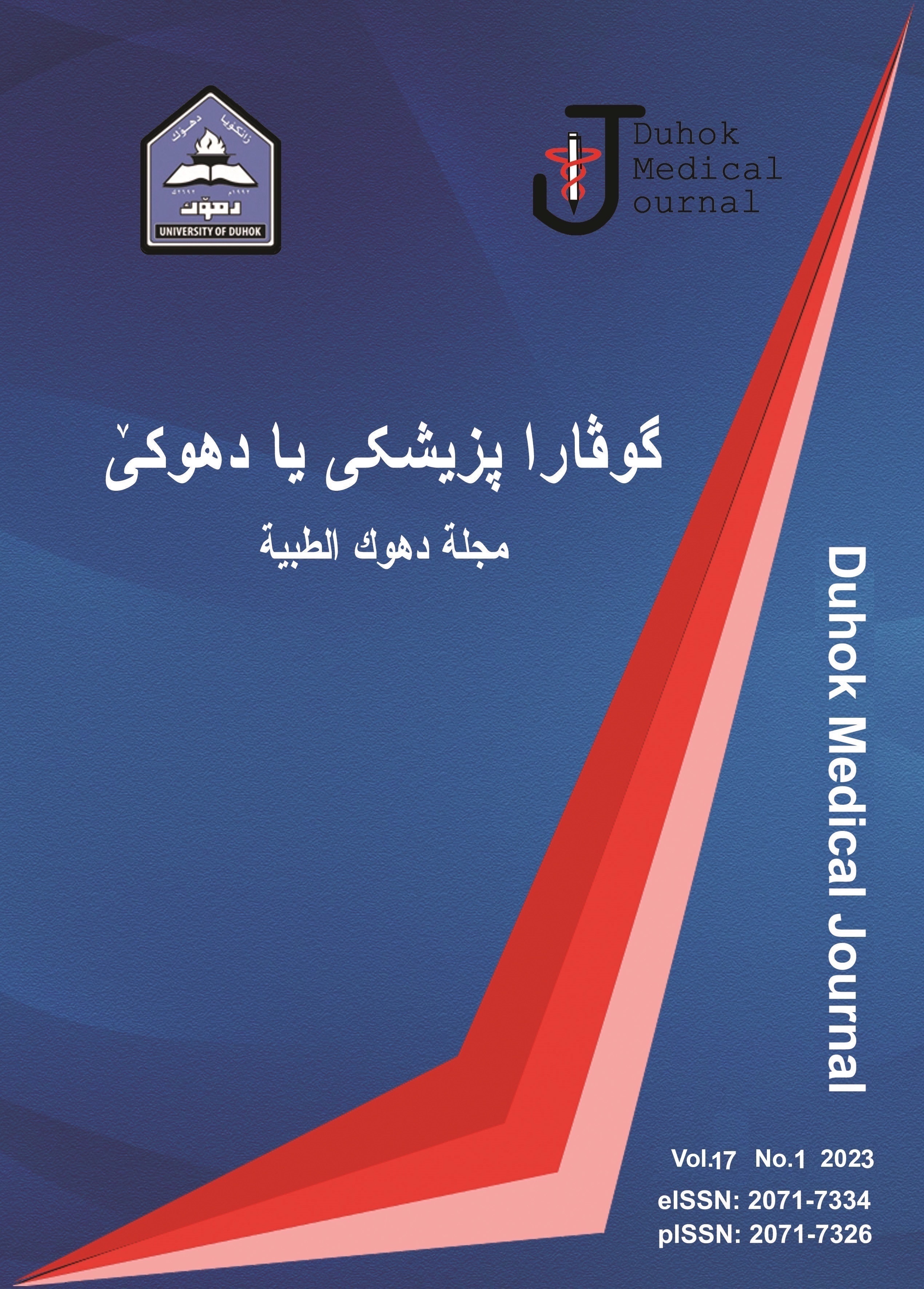MENTAL HEALTH AND SOCIAL ACTIVITY PARTICIPATION DURING THE COVID 19 PANDEMIC IN DUHOK CITY
Abstract
https://doi.org/10.31386/dmj.2023.17.1.9
Background: Stay-at-home orders in response to the COVID-19 pandemic have forced abrupt changes to daily routines and lifestyles. This study assessed changes in mental health and social activity during the confinement period, in response to the global pandemic.
Methods: This study was a face-to-face interview survey targeting adults in Duhok city, Kurdistan Region of Iraq. The questionnaire was distributed from October 2021 to February 2022, and collected information on mental well-being, mood, and social activity participation. All questions were presented as “before” and “during” the COVID-19 pandemic.
Results: In total, 407 adult participants have included: 207 females and 200 males. Overall, during the pandemic, mental well-being score was reduced by 13.4% (particularly for the employed), and social participation by 11.1% (particularly for the older age group). Around the same time, the bad mood and feelings score increased by 51.3%. These changes are expected and have been reporworldwidewide.
Conclusion: The COVID-19 pandemic produced significant negative lifestyle effects well beyond the virus itself, and confining people has led to a decline in mental health and social activities. People need support to counteract the effects of confinement on mental well-being, e.g., by providing basic life needs and enhancing at-home communication and physical activity.
Downloads
References
2. Park KH, Kim AR, Yang MA, Lim SJ, Park JH. Impact of the COVID-19 pandemic on the lifestyle, mental health, and quality of life of adults in South Korea. PLoS One. 2021;16(2 February):1-13. doi:10.1371/journal.pone.0247970
3. Renzo L Di, Gualtieri P, Cinelli G, Bigioni G, Soldati L, Attinà A, et al. Psychological aspects and eating habits during covid-19 home confinement: Results of ehlc-covid-19 italian online survey. Nutrients. 2020;12(7):1-14. doi:10.3390/nu12072152
4. Short Warwick Edinburgh Mental Wellbeing Scale (SWEMWBS). NHS Health Scotland, University of Warwick and University of Edinburgh, 2008. [cited Aug 9, 2021]. Available from: https://www.corc.uk.net/outcome-experience-measures/warwick-edinburgh-mental-wellbeing-scale-wemws.
5. Andresen EM, Malmgren JA, Carter WB, Patrick DL. Screening for depression in well older adults: evaluation of a short form of the CES-D (Center for Epidemiologic Studies Depression Scale). Am J Prev Med. 1994;10(2):77-84. PMID: 8037935
6. Hann D, Winter K, Jacobsen P. Measurement of depressive symptoms in cancer patients: Evaluation of the center for epidemiological studies depression scale (Ces-d). Journal of Psychosomatic Researc. 1999; 46(5): 437-443. doi: 10.1016/S0022-3999 (99)00004-5
7. Ammar A, Mueller P, Trabelsi K, Chtourou H, Boukhris O, Masmoudi L, et al. Psychological consequences of COVID-19 home confinement: The ECLB-COVID19 multicenter study. PLoS One. 2020;15(11):e0240204. doi:10.1371/journal.pone.0240204
8. Taha PH. Home Quarantine Induced Health Anxiety During the Beginning of the COVID-19 Pandemic - Evidence from Iraq. Disaster Med Public Health Prep. 2021; 26:1-6. doi: 10.1017/dmp.2021.242. Epub ahead of print. PMID: 34309501; PMCID: PMC8943275.
9. Karim, SK, Taha, PH, Amin, NMM, Ahmed HS, Yousif MK, Hallumy AM. COVID-19-related anxiety disorder in Iraq during the pandemic: an online cross-sectional study. Middle East Curr Psychiatry 27, 55 (2020). https://doi.org/10.1186/s43045-020-00067-4
10. Ammar A, Trabelsi K, Brach M, Chtourou H, Boukhris O, Masmoud L, et al. Effects of home confinement on mental health and lifestyle behaviours during the COVID-19 outbreak: Insights from the ECLB-COVID19 multicentre study. Biol Sport. 2021;38(1):9-21. doi:10.5114/biolsport.2020.96857
11. Hamer M, Yates T, Sherar LB, Clemes SA, Shankar A. Association of after school sedentary behaviour in adolescence with mental wellbeing in adulthood. Prev Med (Baltim). 2016;87:6-10. doi:10.1016/j.ypmed.2016.02.021
12. Fleshner M. Physical activity and stress resistance: Sympathetic nervous system adaptations prevent stress-induced immunosuppression. Exerc Sport Sci Rev. 2005;33(3):120-126. doi:10.1097/00003677-200507000-00004
13. Senaratne N, Stubbs B, Werneck AO, Stamatakis E, Hamer M. Device-measured physical activity and sedentary behaviour in relation to mental wellbeing: An analysis of the 1970 British cohort study. Prev Med (Baltim). 2021;145 (January):1-6. doi:10.1016/j.ypmed.2021.106434
14. Radu MC, Schnakovszky C, Herghelegiu E, Ciubotariu VA, Cristea I. The impact of the COVID-19 pandemic on the quality of educational process: A student survey. Int J Environ Res Public Health. 2020;17(21):1-15. doi:10.3390/ijerph17217770
15. Taha PH, Karim SK, Amin NMM, Thomson R, Blazeska KK, Slewa-Younan S. Influence of sociodemographic characteristics on knowledge and attitudes about COVID-19 in Northern Iraq. Arab Journal of Psychiatry. 2022; 33(1): 74-90. doi: 10.12816/0060343
16. Znazen H, Slimani M, Bragazzi NL, Tod D. The relationship between cognitive function, lifestyle behaviours and perception of stress during the covid-19 induced confinement: Insights from correlational and mediation analyses. Int J Environ Res Public Health. 2021;18(6):1-12. doi:10.3390/ijerph18063194
17. Ammar A, Chtourou H, Boukhris O, Trabelsi K, Masmoudi L, Brach M, et al. Social participation and life satisfaction of peoples during the COVID-19 home confinement : the ECLB-COVID19 multicenter study. medRxiv. Published online 2020. doi: 10.1101/2020.05.05.20091066
18. Cauberghe V, Van Wesenbeeck I, De Jans S, Hudders L, Ponnet K. How Adolescents Use Social Media to Cope with Feelings of Loneliness and Anxiety during COVID-19 Lockdown. Cyberpsychology, Behav Soc Netw. 2021;24(4):250-257. doi:10.1089/cyber.2020.0478






